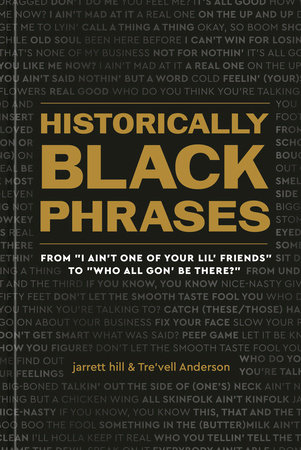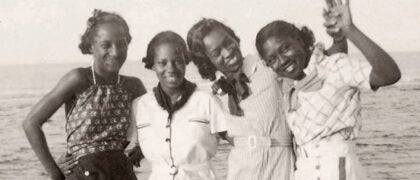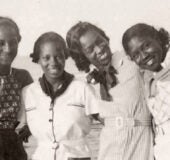Introduction Do you remember the first time you recognized that Black people speak differently than others?
For media personality and journalist Shar Jossell, it was when, at four or five years old, she mistook “Lord have mercy” for “Lord ham mercy” and asked her mom for clarification. “That’s when I realized things were a bit different,” she says. “Because we had daily oral language as part of our language arts classes in elementary school, but around family and around church, tongues were a little bit more lax.”
For writer-director Patrik-Ian Polk, it was when, as part of the first generation of Black folks to go to desegregated schools in 1970s Mississippi, he found himself in classes with white students and became more conscious of an ability and need to code-switch as a means of fitting into two worlds.
For actress Danielle Pinnock, who grew up in a predominantly patois-speaking community of Black folks, it was when she went to private school and was made fun of for pronouncing “three” like “tree.” Or when a little white girl on her elementary school bus violated cardinal rule number one of Black communication—thou shalt not talk about people’s mama—and got mollywhopped.
As Black people, we all have a moment that comes to mind when we first realized just how unique our ways of speaking can be. All too often, however, we were and are told by broader society that how we weave together parts of speech is wrong, or a violation of grammatical mores. We’re given “all these narratives about things being broken, or our language being messed up, country, ghetto, lazy,” says Dr. Anne H. Charity Hudley, a professor of education, linguistics, and African-American studies at Stanford University. And the result is a great difficulty in getting people to understand—even other Black people—that “Black language is a language. It’s part of our culture [and] something that should be documented and studied and taught.”
How we talk that talk is special. “It’s got some seasoning on it,” says actor Marque Richardson, “but it’s also not monolithic.”
“I think of flavor,” adds media personality and actor Kalen Allen. “We put our own spin on how to say certain things. We add a lot of emphasis.”
Polk cited a particular musicality, rhythm, and attitude that we all seem to have or are able to more easily understand than our non-Black counterparts.
“It’s something from the outside looking in that you can’t understand, and from the inside looking out, you can’t explain,” says Dr. Charles H.F. Davis III, professor at the University of Michigan. Put more simply: If you know, you know.
Dr. Charity Hudley explains: “When I think of Black language and culture, what I think about is what it tells me about the human mind, the human condition, and how culture is formed. It shows how we as Black people have been able to share and create in these places and spaces in a way that now everybody’s trying to sound and be like us. It shows something way past resilience into how art is made in the world.”
Our speech is art made verbal. “I’m talking about the lexicon, the vocabulary, but I’m also talking about the grammatical practices, the sound,” she continues. “I’m talking about intonation. I’m talking about the way that I tell stories, the way that I express myself in the world, culturally and creatively.”
And even though there are variations in dialects and accents, the ways something may be said in the Northern California Bay Area is connected to what’s said in Charleston, South Carolina, which is connected to what’s said in Orange, New Jersey, which is connected to what’s said in Kansas City, Missouri, which is connected to what’s said in Chicago, Illinois. This is the impact of the Great Migration as evidenced by a joke Jossell heard growing up: “Chicagoans ain’t nothing but Mississippi niggas with coats on.”
How might you describe the ways we speak, the distinctly us, but difficult-to-pinpoint ways we communicate? Every Black person from here to Mozambique could answer in a different way and we would still never really explain the specific sounds, tones, inflections, and necessary gestures that make it all mean this and not that.
Historically Black Phrases is a celebration of that complexity. It’s a fun yet thoughtful documenting and recording into written history of the ways we’ve said
what we said and told our stories in our way. Our culture-shaping way. Our industry-building way. Our neck-rolling, fist-dappin’, tooth-suckin’, stereotype-defying, community-building, boundary-breaking, justice-seeking, expectation-exceeding, always innovative way.
For far too long we’ve been told that our language is broken or unprofessional or difficult to understand. And so we’ve felt like we can only flex our true linguistic brilliance when we’re at the cookout or in the club or otherwise unconcerned with respectability and the white gaze. But the legitimacy of how we talk is not incumbent upon others’ approval.
As you flip through these pages, we hope it takes you down memory lane. We hope it reminds you of roasting each other on the playground or running home before the streetlights come on. We hope you’re transported back to the church pew or ball or house party where Blackness was on full display. We hope it’s the source of nostalgia-induced laughs and plenty of carryin’ on. And we know that you know there’s not just one Black experience, so no single text could fully represent the vastness of our language.
This book is about pride and preservation.
Historically Black Phrases is our love letter to our people. We see you. We see each other.
Copyright © 2023 by jarrett hill and Tre'vell Anderson. All rights reserved. No part of this excerpt may be reproduced or reprinted without permission in writing from the publisher.
















